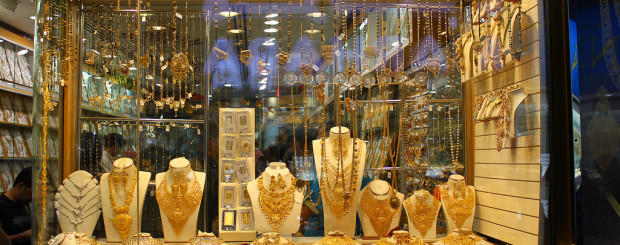How to Haggle at the Gold Souks in Dubai like the Pros
This is the Middle East and Dubai is really just a great big souk, a traditional Arab marketplace, where buying and selling is done, so don’t be afraid to haggle; but equally, know when to haggle and when not to. There is no point haggling in a fixed price store.
For one thing, you are probably not being served by someone who has the power to make a decision about prices. Most regular shops in Dubai are staffed by shop assistants here on working visas from their home countries. They have no decision making power.
There is no point haggling in a luxury goods store such as Chanel or Louis Vuitton. The general rule is that if an item has an official looking price tag on it in a smart shop, then it probably won’t be a good place to try your bargaining skill. You could just end up embarrassing yourself. But if there are no price tags and you are buying something of a traditional or local nature, such as a shawl or textiles, then give it a try.
Where should I Haggle?
The Gold Souk is one place where you must haggle. If you see something you like, it will be weighed in front of you, and the starting price quoted to you. This is where the haggling begins. It is not just gold that you can haggle over. You should also dispute the initial price quoted to you on any jewelry item.
As well as the Gold Souk, you might like to visit the Gold and Diamond Park or the Souk Dubai Mall. These are also places where haggling is acceptable.
In addition to gold and gems, it is not inappropriate to attempt a little gentle haggling in watch shops, even high-end watch shops. The haggling process in these shops follows a different trajectory as the shop assistant does not always have the power to make the decision you want, but what he or she can do is telephone the brand manager to see if any movement is possible on the price. But, as I say, be gentle as discounting prices in these stores is not the norm; it is discouraged.
Where you can be more certain of a receptive response to your bargaining ploys is in any of the shops that sell traditional goods from the Middle East such as pashminas, cushion covers, slippers, and jalabiya. The shops that look like scenes from Arabian Nights illustrations. They usually do not have prices on anything and this is the number one signal that the haggling game is on.
Textile shops are also places where you can get some movement on the price both in the Meena Bazaar near the Dubai Museum and in Satwa. Textiles are a good buy and come in amazing varieties, such as silks with pearls attached. If you buy a lot, get into the bargaining with the man who is serving you. Do not leave it until you get to the cashier as once the price is written down on the official receipt, it will not be changed.
Carpet stores are also places where you are expected to bargain. This can be a lengthy business and is not an ideal activity if you are tired or jetlagged, so pick your moment.
How do I Haggle?
The techniques vary depending on the type of store you are in; I have already mentioned that you need to approach the matter gently in a watch shop, and this applies to any situation where you are not sure if haggling is appropriate or not. If uncertain, start off cautiously and be prepared to drop the procedure if you have made a mistake.
Haggling in gold shops is likely to be the thing for you. The gold price is set internationally on a daily basis. In fact, it fluctuates within the day, but most places post the gold price at the beginning of the day and stick to that price. The gold price, for 24 carat gold, should be clearly shown in the store. You would be wise to check the price yourself before you leave the house/hotel, so that you can compare it to the price displayed. If it is not clearly displayed, ask the shop assistant what they are charging on that particular day.
Once you have chosen a piece that you might like to buy, the shop assistant will weigh it in front of you, ask what currency you want the price in, then do a series of rapid taps on a calculator, and finally, he will brandish the calculator in front of you to display the price. This is the time for you to either frown slightly or keep a completely blank expression on your face. Ask about the quality of the gold. Is it 24 carat? Isn’t it rather pale? Perhaps it is only 18 carat. Expressing doubts about the quality of the gold is a good ploy, but there are others.
Ask what the price would be if it was calculated at today’s gold price, only. It will be less but should not be dramatically less than the original price quoted to you. If the original price quoted is 30 percent higher or more, you may be dealing with someone who has no intention of giving you a reasonable price. The work put into a piece of jewelry is charged for, but if it is a locally made piece, it should not be much.
I have sometimes managed to get simple bangles or necklaces at the gold price or a maximum of ten percent above it. It depends on how keen they are to sell.
Imported jewelry commands a higher premium over and above the actual cost of the weight of the gold, but then it is often a lower carat product. So be wary.
By a process of offer and counter-offer you may reach a price that you are both “happy” with. The price will be what you are willing to pay and what the merchant is willing to sell for. Engage in the process with patience and humor. You will get the best prices through being charming not through being aggressive.
If you decide it is just too expensive, thank the shop assistant for his time and begin to walk away. He will only let you go if you have had an unreasonable price in mind. If you are anywhere near what he can sell for, he will find a way to draw you back into the game.
Those items that nag at you after you have turned your back might be found elsewhere. Try several different shops. Many of them have similar items and you will soon get a feel for what constitutes a reasonable price.
Gold shops have high turnovers and this is probably why the process of bargaining in them is usually fast relative to the process in carpet shops. Even if you only want to buy a small, tribal rug that you expect to pay less than AED 400 for, the process will still be a slow one. Be very clear about what you want to see, if you know that is.
Accept the cold drink you will likely be offered and sit down to look at the carpets as they are unfurled before you. If time is an issue, get some talk about prices started as soon as possible. It is often difficult as the sellers aim to entrance you with their wares and get you hooked on carpets far more expensive than you originally intended.
Unlike in the gold shops, you are in real danger of being over-charged in a rug shop if you do not know what to expect to pay. Always offer a price far below the original starting price, just don’t do it offensively. It’s a game, but one you are unlikely to win. The best defense is to look at a lot of different shops, so it takes time. Once you have bought something, stop looking as you may well find the same at a cheaper price, but why do that to yourself?
Will I get What I Pay For?
As I mentioned above, if you do not know what you are looking at or what a reasonable price is, in a rug shop there are no guarantees. You will get a rug. If you get it a good or bad price depends on your knowledge and haggling skill, so do some research.
In the gold shops, you are very well protected. The gold price is set, the item is weighed before you and if you come to an agreed price, you will get a receipt. The gold shops are closely monitored, so it is highly unlikely that you will be deceived. If you are sold a piece as 18, 22 or 24 carat gold, it will be what it says it is. You may end up paying a higher premium than a resident with more experience, but it is still likely to be far cheaper than you can get in the UK or the USA. So, relax and have a go!








